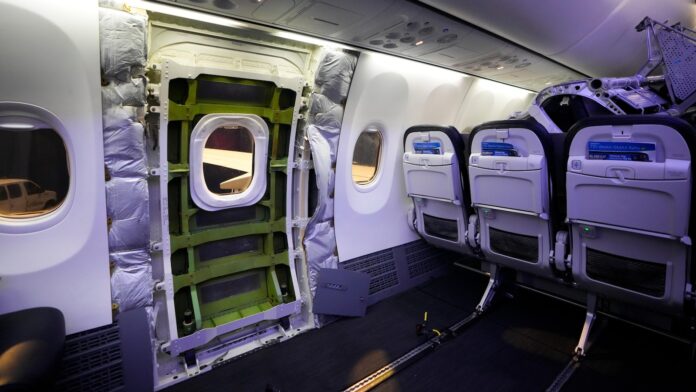The Department of Justice has filed an agreement with Boeing Wednesday, in which the aviation giant will plead guilty to fraud charges that it misled U.S. regulators who approved the 737 Max jetliner before two of the planes crashed, killing 346 people.
The detailed plea agreement was filed in federal district court in Texas. The U.S. aerospace company and the Department of Justice reached a deal on the guilty plea and the terms and conditions of the agreement earlier this month.
The final version states that Boeing admitted that it entered into an agreement through its employees “by unfair means” to defraud the Federal Aviation Administration group evaluating the 737 Max. Because of Boeing’s deception, the FAA had “incomplete and inaccurate information” about the plane’s flight control software and how much training pilots would need to use it.
U.S. District Judge Reed O’Connor could accept the plea agreement and penalty reached by Boeing and prosecutors, or he could reject it, a move that would likely trigger new negotiations between the company and the Justice Department.
The deal calls for the appointment of an independent compliance monitor, three years of probation and a $243.6 million fine. Boeing must also invest at least $455 million “in its compliance, quality and safety programs.”
Boeing was accused of misleading the Federal Aviation Administration about aspects of the Max before the agency certified the plane for flight. Boeing failed to tell airlines and pilots about a new software system, called MCAS, that could roll the plane’s nose down without pilot input if a sensor detected the plane was in danger of entering an aerodynamic stall.
Max planes crashed in Indonesia in 2018 and in Ethiopia in 2019 after a faulty sensor reading pushed the nose down and the pilots were unable to regain control.
Boeing avoided prosecution in 2021 by settling $2.5 Billion Settlement with the Justice Department, including an earlier $243.6 million fine. It looked like the fraud charges would be dropped for good until January, when a panel covering an unused exit blew up on a 737 Max during an Alaska Airlines flight, prompting a new investigation into the company’s safety.
In May of this year, prosecutors said Boeing had failed to meet its obligations. terms of the 2021 agreement by failing to implement promised changes to detect and prevent violations of federal anti-fraud laws. Boeing this month agreed to plead guilty to aggravated fraud charges rather than face a potentially lengthy public trial.
The role and authority of the monitor is seen as a key provision of the new plea agreement, according to experts in corporate governance and white-collar crime. Paul Cassell, a lawyer for the families, has said that families of the crash victims should have the right to nominate a monitor for the judge to appoint.
Some relatives of the passengers plan to ask the judge to dismiss the settlement. They want a full trial, a stiffer penalty for Boeing, and many of them want current and former Boeing executives to be charged.
If the judge approves the deal, it would apply to criminal charges stemming from the 737 Max crashes. It would not resolve other cases, including a potential lawsuit related to the Alaska Airlines blowout.
O’Connor will give the families’ lawyers seven days to file legal motions against the settlement. Boeing and the Justice Department have 14 days to respond, and the families have five days to respond to the company and government filings.


